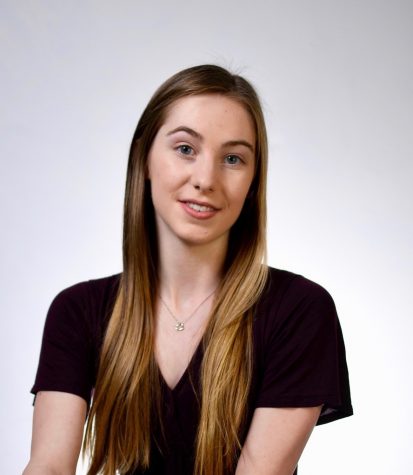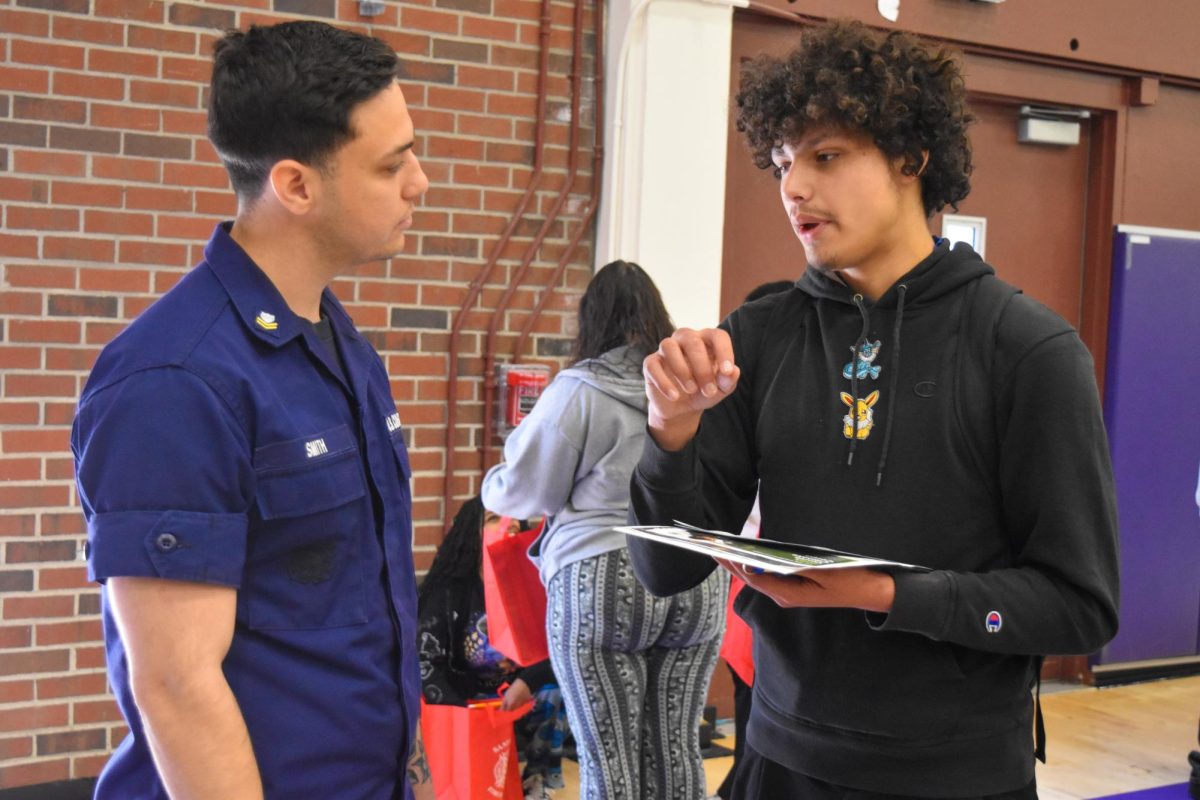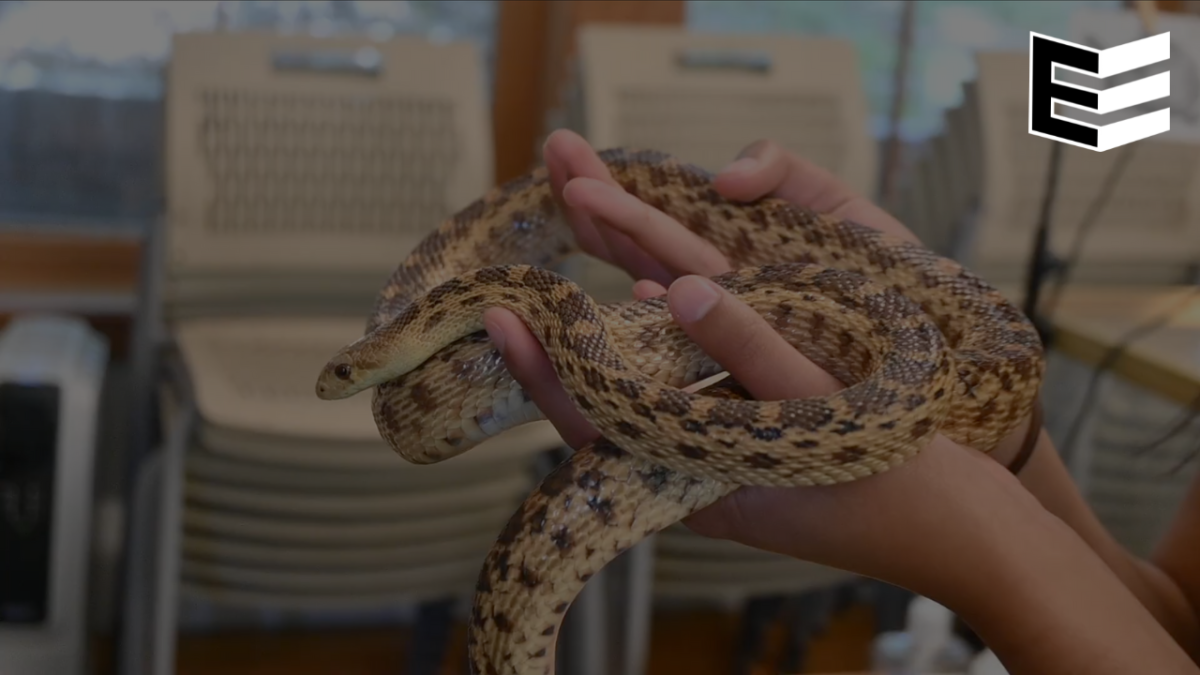The pursuit of happiness. One of the three “unalienable rights” recognized by the founding fathers of the U.S. when they created the Declaration of Independence. Although finding happiness may have been important to the founders of the country, studies show that Americans are currently prioritizing happiness less than they have in previous years.
According to the 2017 World Happiness Report, happiness in America is at a 10-year low. In 2011, to address the issue of unhappiness around the globe, the United Nations (UN) decided to designate March 20 as the International Day of Happiness. In light of happiness day, here’s a peek at how MVHS students and staff alike find happiness in their daily lives, from stepping back to explore the world around them to making time for their passions.
Providing support
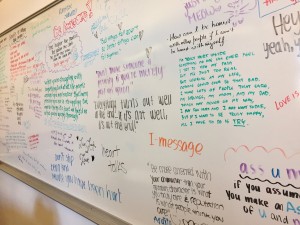
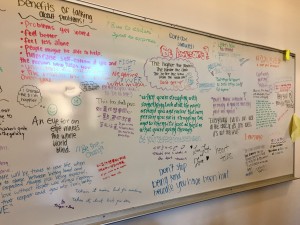
Prinz’s whiteboard in his room is filled with quotes from students who he advises. Photo by ZaZu Lippert.
Student Advocate Richard Prinz sits in his office and gazes at his large whiteboard, showcasing a breakdown of students’ thoughts and feelings. Given his psychotherapy license and his experience talking to MVHS students about their emotional issues, he understands that happiness comes in many different forms. Sometimes, Prinz believes that people are so caught up in ensuring their future happiness that they forget to appreciate what is happening in the moment.
“[Happiness is] identifying with something that’s bigger than just temporary things,” Prinz said. “It is not going to your target college, because then you get there and then you think, ‘If I only had a good job, then I’d be happy. Only if I had a partner in life, then I’d be happy.’ You’re always putting your happiness off.’”
On the other end of the spectrum, Prinz notes that there are some people who seek immediate pleasure, but often face regret later. For example, they may prioritize playing video games or browsing social media over doing homework.
“We just go with the first thought that comes up in the mind, ‘I hate homework,’ and then we reinforce it by telling ourselves that over and over and then it becomes a habitual thought,” Prinz said. “Once it becomes habitual, we start to believe and then becomes a truth, and then we spread it around others and then it becomes part of the community.”
In order to make the most of these thoughts, history teacher Scott Victorine recommends that people view a negative situation in a different way. This practice is the basis of what he calls “positive psychology.”
“If we take a look at some of the traditional western forms of psychology, they tend to focus on what’s wrong with people and how to treat it,” Victorine said. “Positive psychology focuses more on what is right with people. Instead of thinking about it as, ‘Oh, you have this type of problem in your life. Here’s how you solve it,’ positive psychology looks at the things that are going well in your life and how can you use those to be more supportive in areas that you’re struggling.”
Stitches and seams 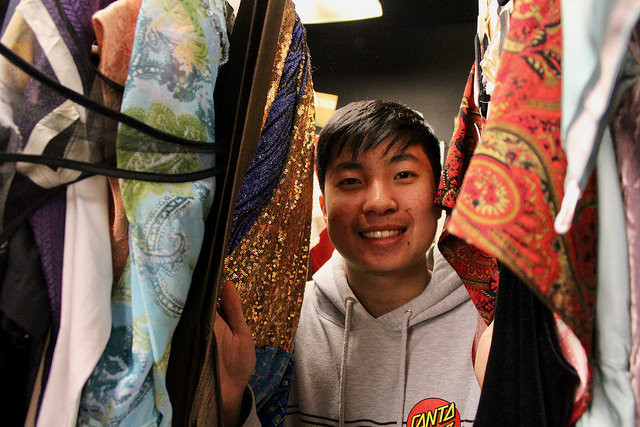
Photo by ZaZu Lippert.
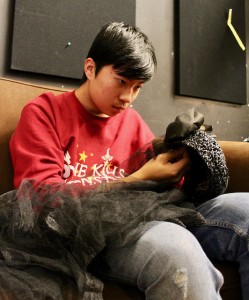
Sophomore Kevin Sun, a member of the MVHS drama community, finds his happiness through making costumes for the productions that the drama department puts on. Sun is currently the head costume designer for the upcoming musical, ‘Urinetown,’ after having assistant costume designed for last year’s musical, ‘The Little Mermaid,’ and the fall play, ‘She Kills Monsters,’ with professional industry designers. But there’s more that goes into costuming than simply sketching and sewing. As Sun explains, hours of research are necessary to get even to the point of sketches, and continues from there.
“Usually I have to do one or two sketches before I’m actually happy with what it looks like. Then I go pull stuff from the loft and, if needed, buy fabric or buy other accessories or just other clothing. Then I make the costumes,” Sun said. “Fittings happen, and then I make adjustments as needed.”
The ‘loft’ that Sun refers to is the space on the upper level of the black box where all costumes from past shows are stored, along with pieces the drama department has acquired over the years. Divided into sections, the wedding dresses used for yearly productions of Romeo and Juliet sit just to the left of the long access ladder, and clothing sorted by period, from the 1920s to today, sits opposite. Sun can, in some ways, travel through time in this space as he focuses on a time period or a style to bring a show to life.
However, like most students at MVHS, Sun understands that he can’t spend all of his time doing what he loves. With many other extracurriculars and a constant amount of schoolwork to be finished, he has had to find a balance between the things he loves and the things that have to be done on a daily basis.
“The beginning of freshman year, I had this fixed mindset, as they call it, where I had to get really good grades and that’s all that mattered,” Sun said. “I wasn’t really passionate about a lot of the stuff I was learning about in school, but I still made that my very first priority. But towards the end of freshman year and maybe early sophomore year actually … I kind of shifted to more of a growth mindset where I focused more on learning instead of getting the A.”
As Sun says, he doesn’t necessarily prioritize one over the other, but rather “makes time” for his passions along with his responsibilities, balancing his time spent in the drama department’s stash of costumes with a needle and thread and that spent at home doing homework. For him, this balance is everything, because the rewards are big.
“[When I saw my pieces onstage for ‘She Kills Monsters’], it was like ‘Wow, I did that,’” Sun said. “[The costumes] could be really different from another person’s point of view, and it’s really cool to see how I helped Mrs. Capule [and the assistant directors] portray [their] vision of what the show would look like.”
For Sun, creating a balance has helped him take the good with the bad. Victorine emphasizes that one common misconception that people have is that avoiding pain and stress at all costs results in happiness. He instead challenges people to view difficult experiences as opportunities for growth.
“Stress is a normal part of our lives, but it’s only a problem when it becomes what we called ‘distress’ or where there’s no recovery time during periods of stress,” Victorine said. “If students know how to redirect themselves in a way that’s more upbeat or optimistic or positive, it’s going to allow them to deal with situations that are either stressful or more challenging in different ways.”
In Leaps and Bounds
PE teacher Dasha Plaza begins her fourth period Dance PE class by asking her students if they’ve paid attention to the weather.
“Did you look at all the blossoms on the trees today? It’s such a beautiful day outside!” she says as her students roll out mats and grab resistance bands for the workout that day.
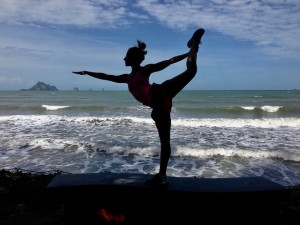
For Plaza, happiness is all in perspective. She doesn’t see herself as the same person as she was a year ago or even yesterday. As she has changed, so has her idea of happiness. Today, her happiness stems from anywhere. It can come from the assurance of knowing that her family is healthy or being greeted by a colleague or student as she walks onto campus. Plaza finds happiness and inspiration from the world around her.
“When I drive off to work, I actually look at the sky and notice how beautiful the colors are,” Plaza said. “Looking at the greens, the leaves, the trees, and seeing, noticing it, not taking it for granted [is important]. Because life is too short, and I think the more you pay attention to your surroundings, the more you notice, the louder the music of nature [becomes, and] everything becomes more vibrant.”
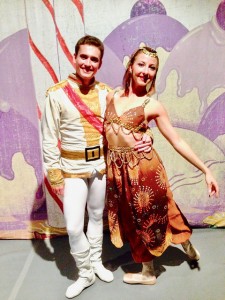
Plaza utilizes this inspiration in the dance studio. Although there are other ways in which she expresses herself, movement and music have always been her most natural forms of expression.
When she can let go of worries about whether her choreography or movements measure up to anyone else’s, and she can just trust herself and become one with everything around her, she feels truly happy. And even as a dance teacher who focuses on music and movement, this mental health through connectivity and happiness is just as important to her as physical, because she feels that both mental and physical well-being are necessary to balance a person.
“The physical shell of who we are doesn’t really mean much,” Plaza said. “It’s [being healthy in your mind and your heart], nourished and balanced and that goes back to happiness […] I believe that a lot of times, happiness […] is the source of life.”



